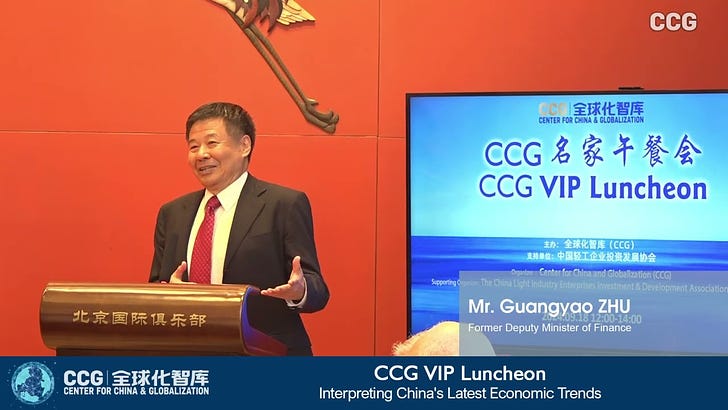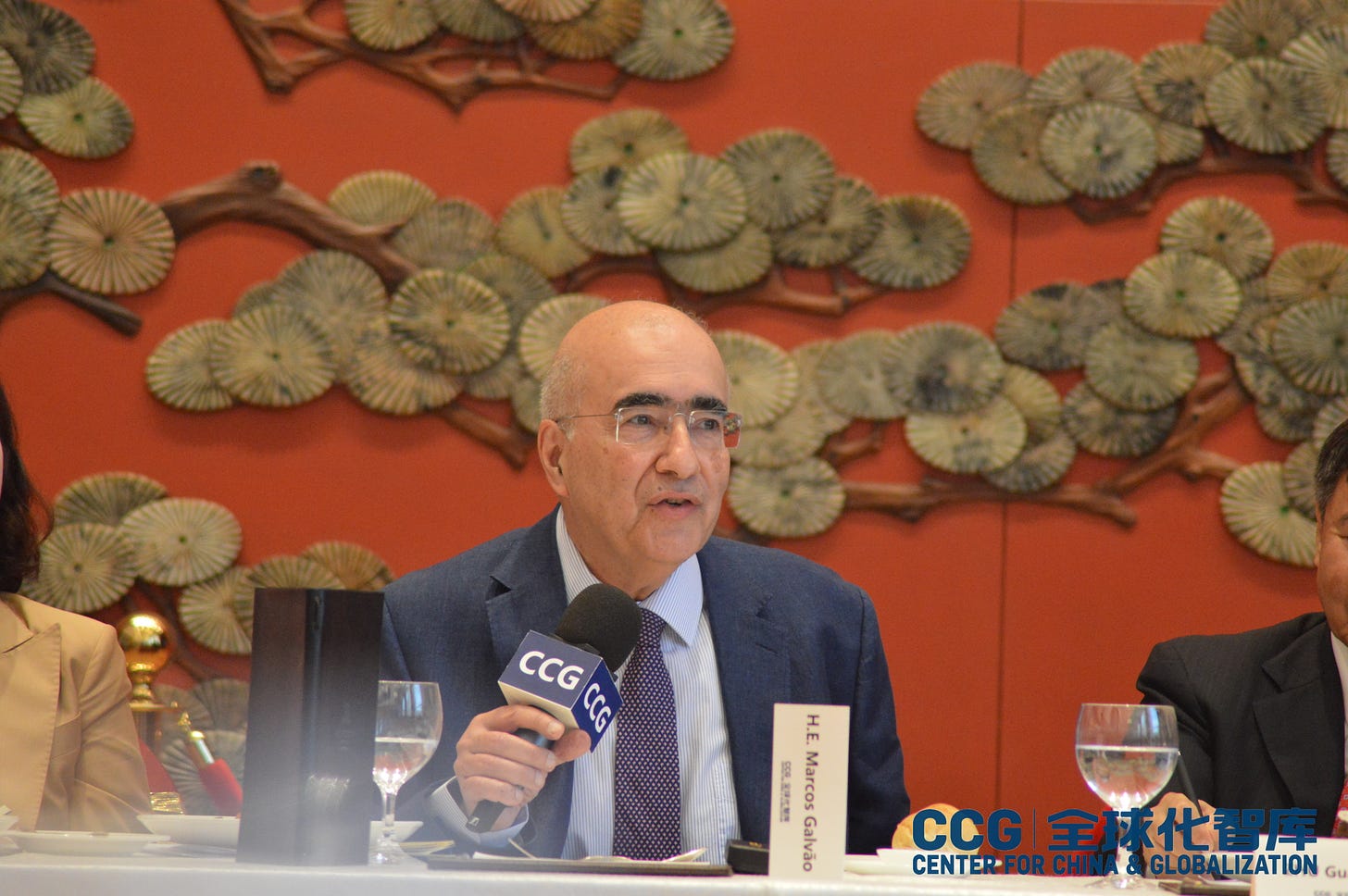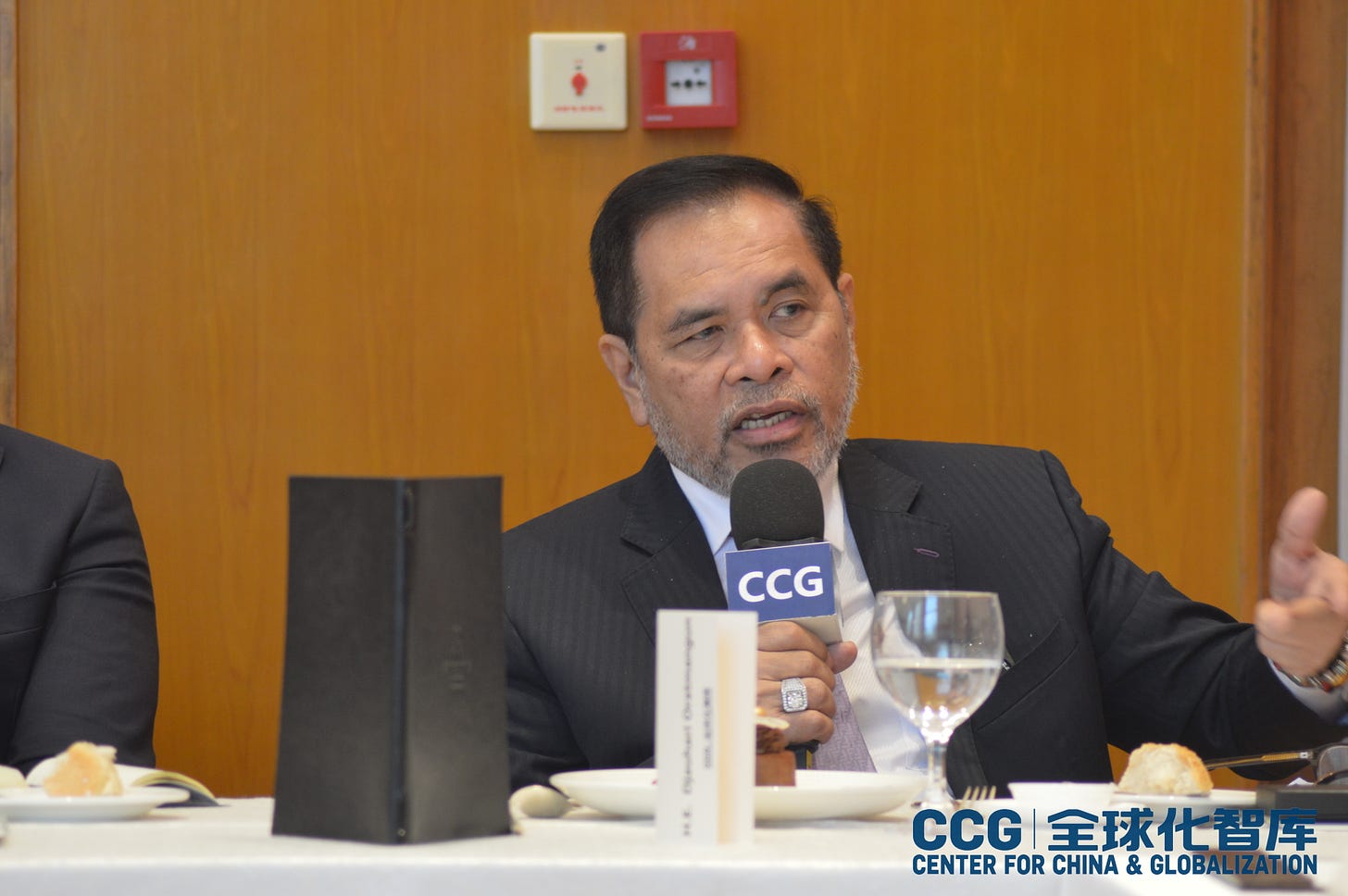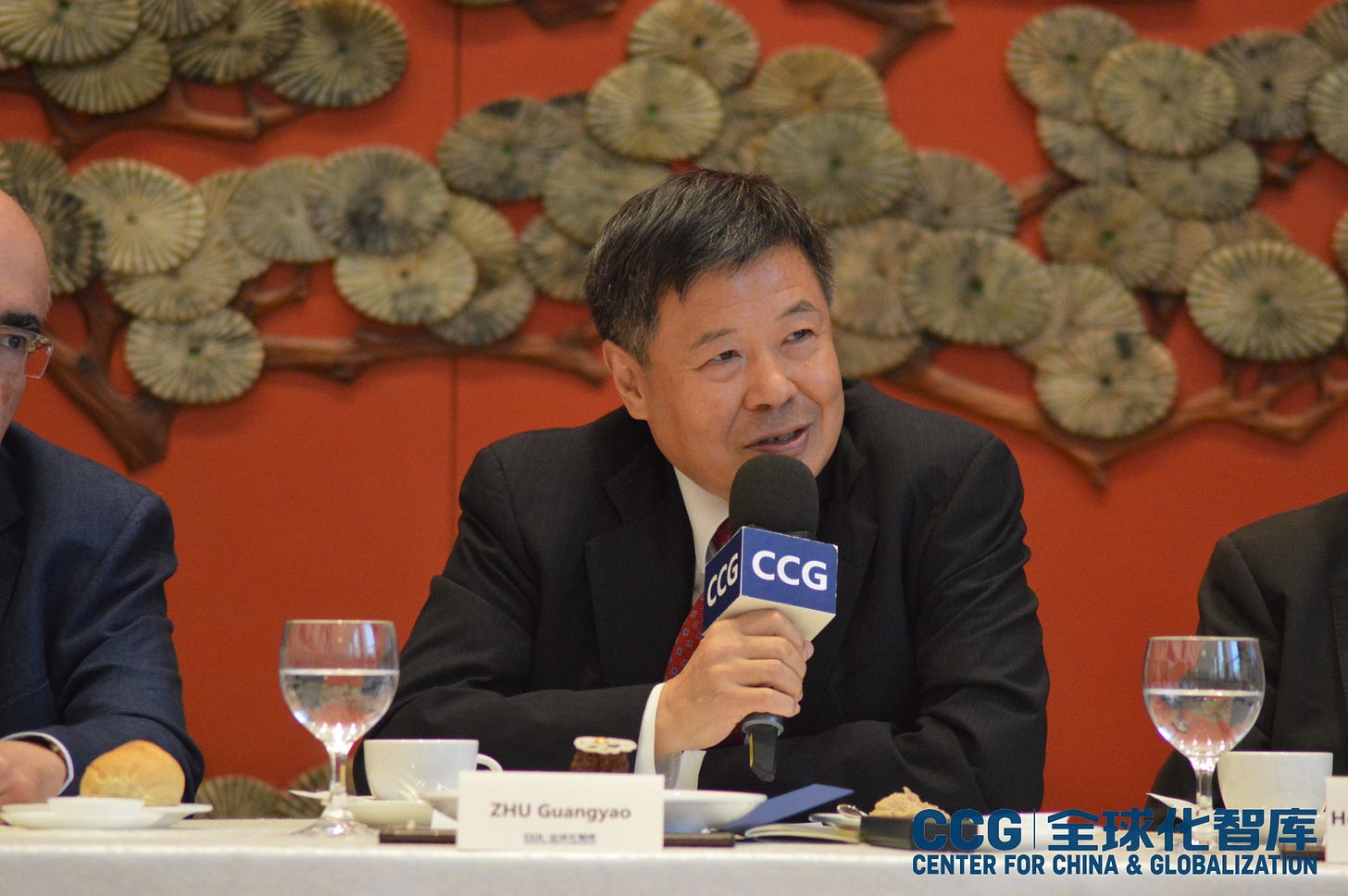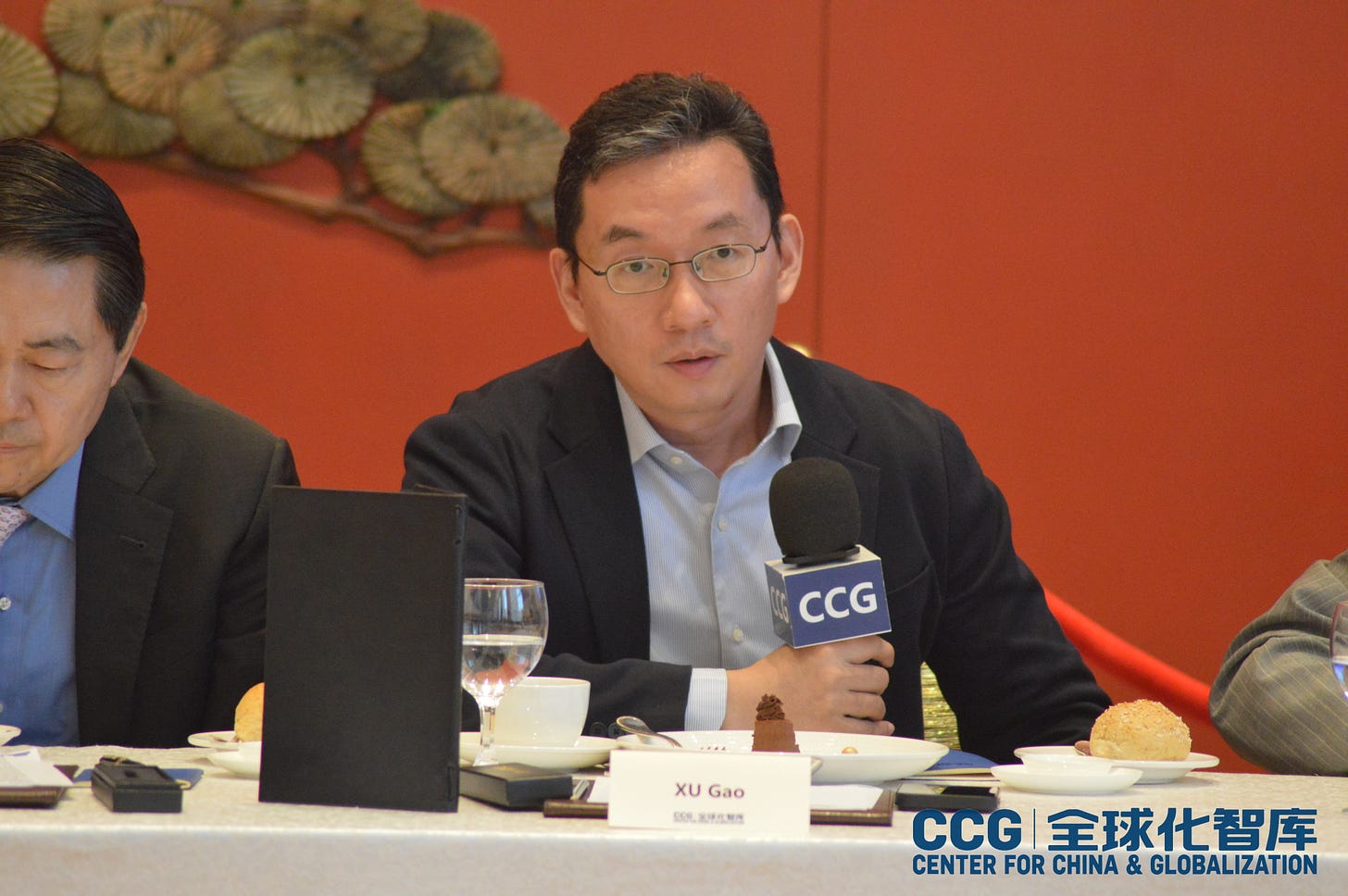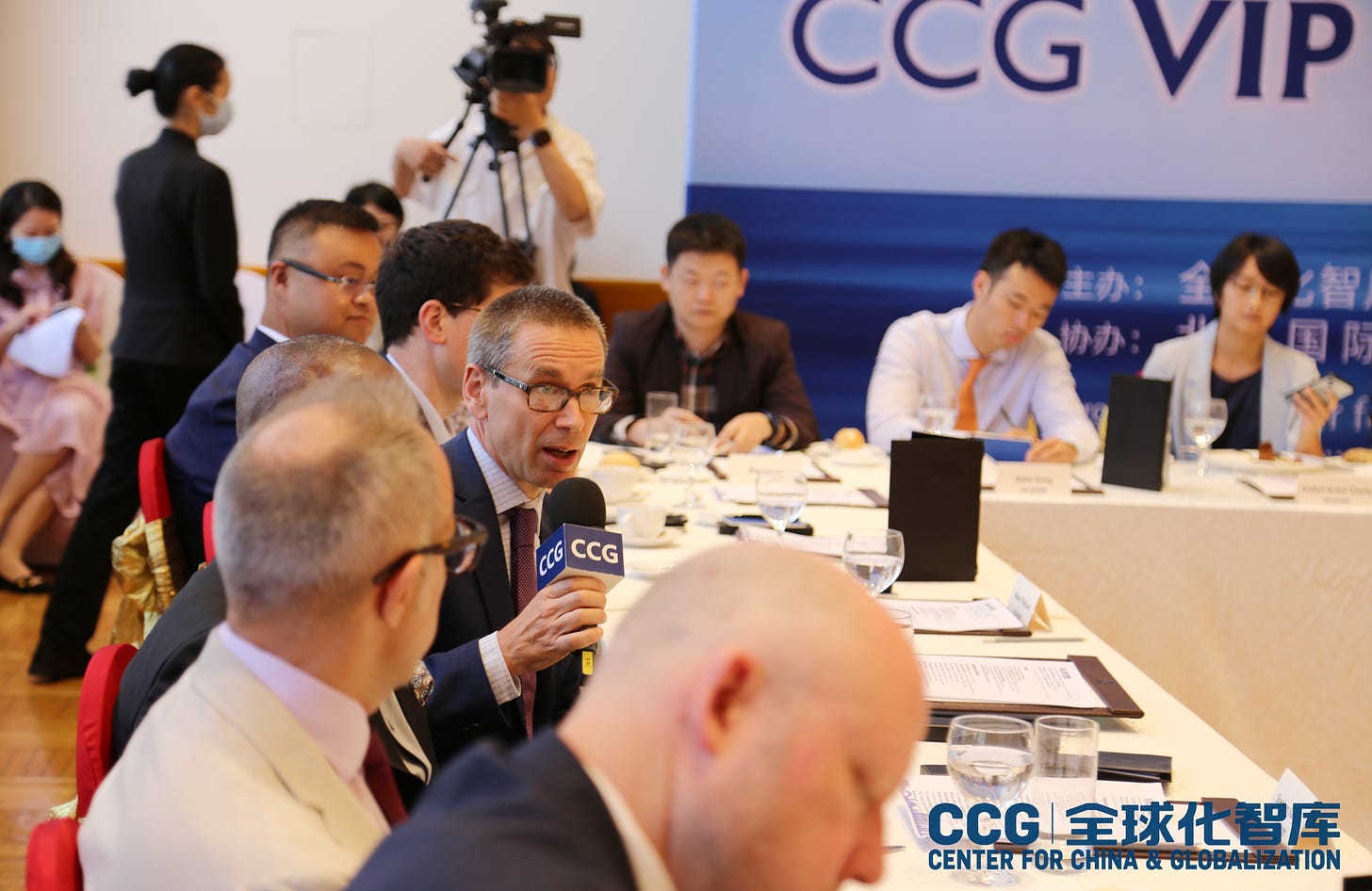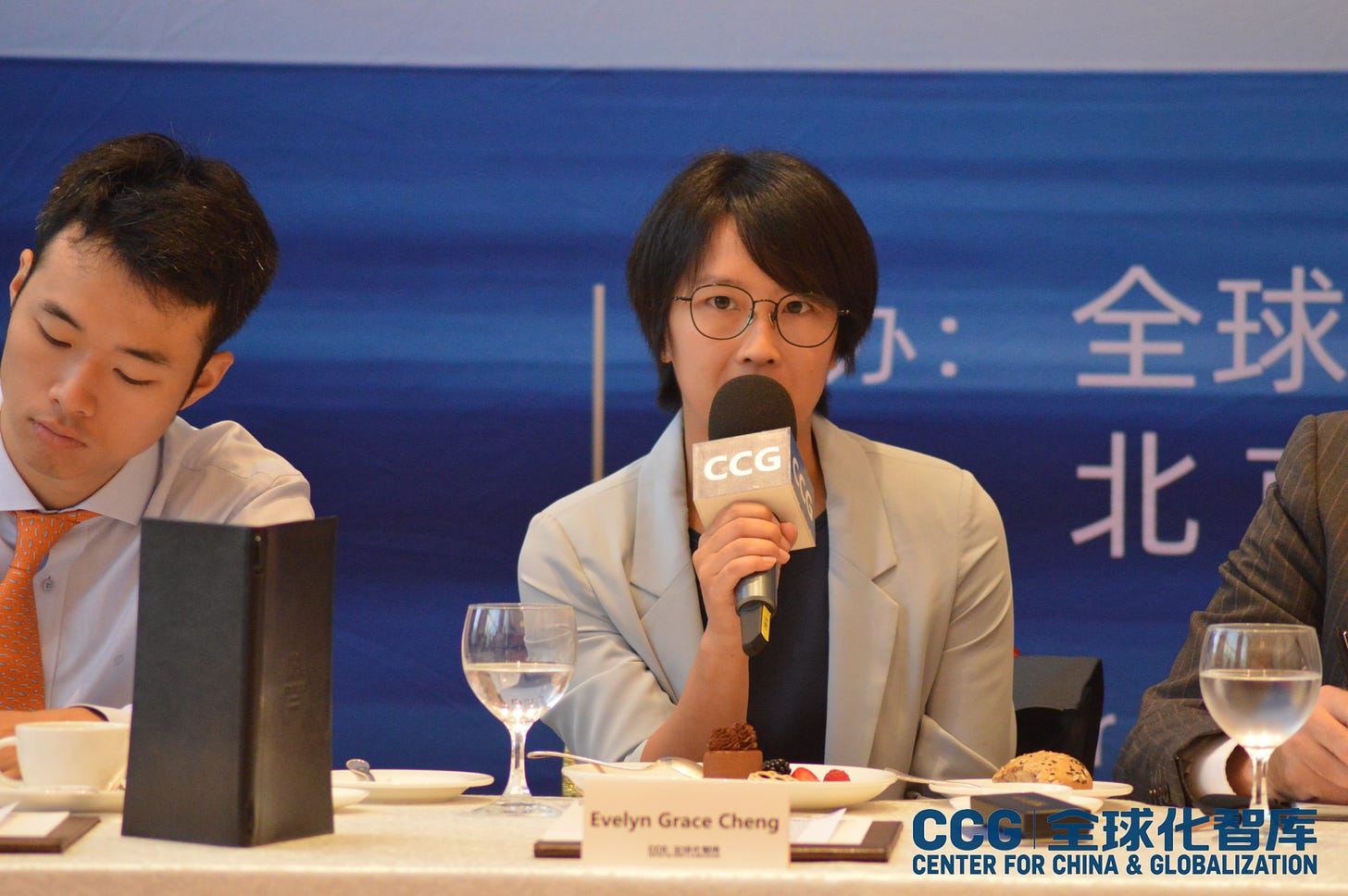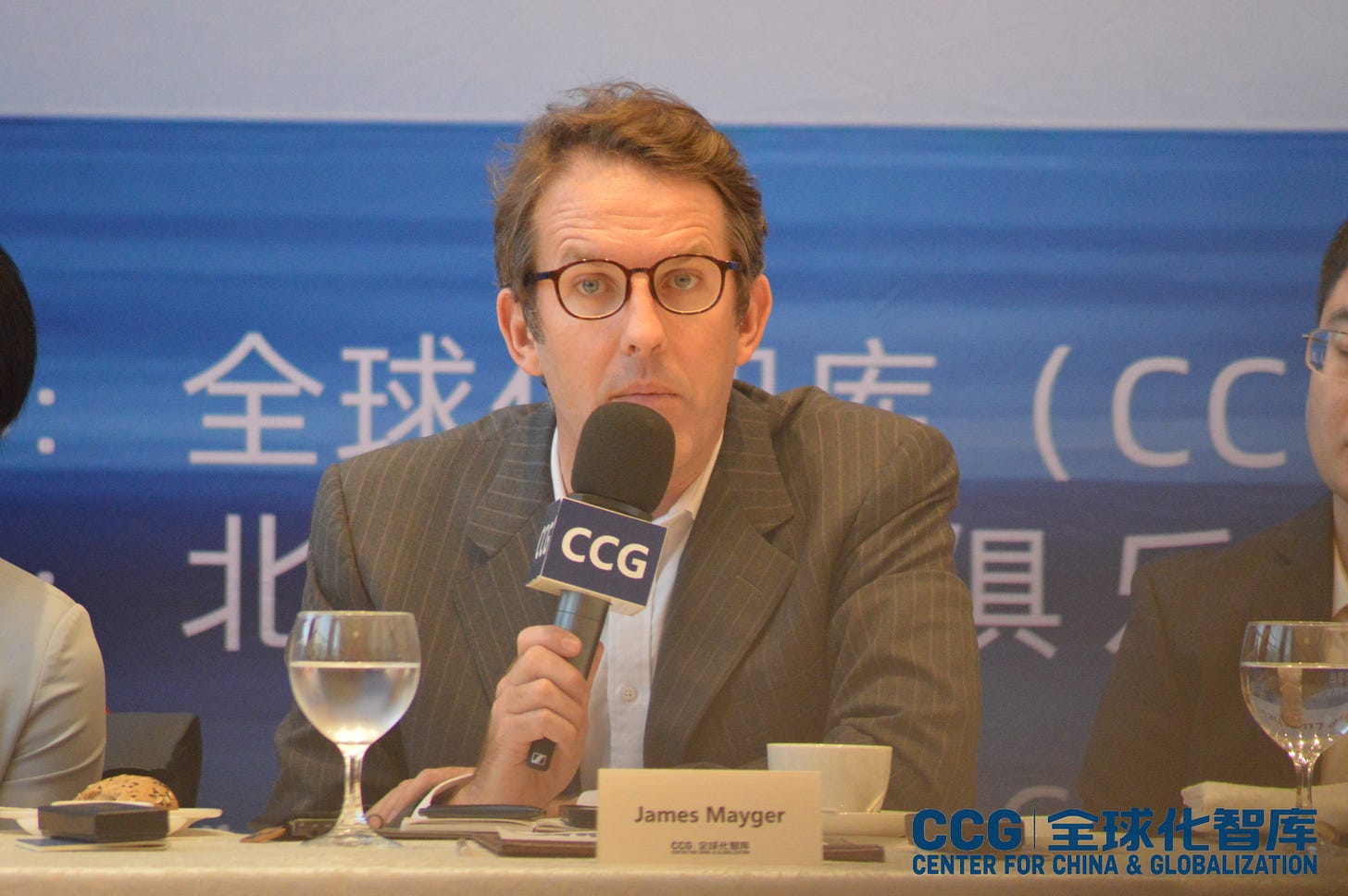Transcript 2/2 of Zhu Guangyao & Xu Gao
Live Q&A with former Vice Minister of Finance and Chief Economist of Bank of China International at CCG VIP luncheon
This is the latter half of the whole transcript of the fourth CCG VIP Luncheon held on September 18, featuring Zhu Guangyao, Former Vice Minister of Finance, and Xu Gao, Chief Economist of the Bank of China International (China) Co., Ltd.
It's important to note that Beijing has dramatically changed its monetary policy and signaled significant changes to its fiscal policy.
In this part of the live Q&A session, Zhu Guangyao identified the allocation of greater fiscal powers to local governments as the priority for China's fiscal reform, though he acknowledged that this year, "there are some difficulties because the revenue increase is relatively lower than expectations." Xu Gao called for the central government to bail out local governments and property developers, advocating for a minimum 3 trillion yuan [427.7 billion U.S. dollars] stimulus for the property market.
CCG has broadcast the video recording of the full event on Chinese online platforms, where it remains accessible. The video recording has also been uploaded to YouTube.
The transcript is based on the video recording and has not been reviewed by the speakers.
Grahame Morton, Ambassador of New Zealand to China
Thank you, Henry. Thank you, Minister Zhu and Professor Xu. It's been very interesting, both your presentations and your answers to the questions so far.
I think there's been a lot of international and Chinese focus in recent times on industrial measures, industrial subsidies, and industrial tariffs. But I've been interested in the agricultural subsidies. At the moment, 80% of the world's agricultural subsidies are provided by China, India, the United States, and the EU together. And China is the largest declared subsidy provider.
I'm just wondering, as you look into the next Five-Year Plans, both the execution of the current plan, outcomes, and also the future Five-Year Plans, what role do you see for subsidies in the way that the Chinese government looks to influence behavior? Because we hear a lot about the market, and we hear a lot about the reform, but reform to us would indicate a change over time and pivot as well, including more reliance perhaps on the decisions that people are making in response to the market conditions. And that would indicate to us that you have to allow people to feel market conditions. That would, over time, lead to a reduction in subsidies. I would be interested in your views about how this can actually occur through the Chinese system. Thank you.
Marcos GALVÃO, Ambassador of Brazil to China
Minister Zhu, we worked together back in the aftermath of the Financial Crisis when he was China's [inaudible]. It was a very different context. Unlike what is happening today that both our speakers mentioned, which, let's say, the global economy is a drag on the domestic economy, in those days, there was an unprecedented getting-together political will to draw us out of the crisis. For example, in two years, between November 2008 and November 2010, there were five G20 summits. Not even at the end of the Second World War was there such a mobilization of political will globally to face a crisis situation like where we had back in 2008 to 2010.
Fast forward to today, and between then and today, we've seen nothing similar. On the contrary, the international dimension is a drag on economic growth. This affects not only the largest and most relevant economies that occupy the headlines and that affect the global economy. We have an international dysfunction of the community today. We're not into helping each other. The emphasis is on competition and attrition, etc. That we all know.
But I have a practical question to Professor Xu. He mentioned that the rebalancing process between the three, let's say, legs of your income distribution is difficult—between corporate, household, and government. What are the difficulties? It's really a question because I don't know the answer, but what are the main difficulties in transferring more income towards households?
Djauhari ORATMANGUN, Ambassador of Indonesia to China
Thank you very much, Minister Zhu and Chief Economist Xu. Yes, of course, ambassadors here follow closely the economies now. In particular, we pay attention to what they call the tourism economy—how you generate your tourism economy during the Labor Day holiday and then recently, Mid-Autumn, and then in October, which will be the National Day. And of course, next year, how cities like Harbin, Chongqing, Sanya, Xiamen, Fuzhou, Shanghai, and Beijing generate the local tourism economy.
But my question is, because both of you are economists: you were mentioning your relations with the United States from the economic perspective. What will be your perspective on your relations with the European Union, BRICS countries (they are getting a summit as well), Africa (as we've just finished the forum on China and Africa), and then of course, Japan and Korea (they're quite big economies as well), Brazil and India, and ASEAN because for the last three years, ASEAN has been the largest trading partner for China, and vice versa. So how do you see, from the economic perspective, it will contribute to the win-win solution to your economy and to our economy as well? Thank you.
Guangyao ZHU, Former Deputy Minister of Finance
I think the issue regarding industrial subsidies is very important now. There are also some global discussions on overcapacity. I really hope that such kind of very frontal discussion can help us understand this challenge and see how we can work together to deal with that.
For industrial subsidies, I think the U.S. is always No.1. There are two Acts passed in August two years ago by the United States: the CHIPS and Science Act and the Inflation Reduction Act. The CHIPS Act received a total amount of 280 billion U.S. dollars. Among that, 52 billion U.S. dollars is used for subsidies to support the advanced chip companies in the United States. The precondition is that any company that's got subsidies from the U.S. government is not allowed to invest in China for chip factory building for 10 years, not even for just strengthening already-established factories. It's very clear that this innovative policy has a specific target.
Another Act is the Inflation Reduction Act, with a total amount of 740 billion U.S. dollars. Among them, 349 billion U.S. dollars is used as subsidies to support new energy development, with 7500 U.S. dollars subsidy per EV. But the precondition is that it's a U.S. product. It's very clear that there is a large amount of industrial subsidies. We will see what kind of way we can deal with that.
You also mentioned the agricultural subsidies. Certainly, that's a global concern. China is also concerned and supports, within the WTO, discussions on the agricultural subsidy issue. In the next Five-Year Plan, we certainly will focus on innovation and be market-based. That's already outlined in the third plenary session document, which says we will build a high-level socialist market system. That's very important. That's why China insists on opening up to the outside world as a basic national policy in the current challenging global situation. I wish globally, we can have joint action and work together to deal with that. Protectionism is of no help to global efforts to deal with the global climate crisis. We understand how little time is left for human beings.
Ambassador Galvão emphasized the period from 2008 to 2010 when we worked together to deal with the Financial Crisis, followed by the European bank issue. That was very close cooperation and here, it helps us understand some of the real challenges that China must learn from the international society. At that time we discussed the balance of payments issue. Ambassador Galvão educated me that I should agree to 4%. I think history has proved you are right. Thank you very much.
Regarding the very important issue raised by the Ambassador from Indonesia, firstly I should say that ASEAN, as China's No.1 trading partner, has recently quickly developed its relations with China, particularly under the framework of RCEP. We hope that's mutual benefits. We understand that you say China has more than a 100 billion trade surplus. We should work together to enhance cooperation to make the benefits mutual. Mutual understanding and mutual cooperation are very important in China's investment in ASEAN countries.
Regarding more broadly relations between China and its key economic partners from the United States to Europe, Japan, and ASEAN (of course, ASEAN is very important), the real challenge for China and the U.S. is how we insist on mutual respect, coexistent, and make the final beneficial result. For a long time, I've been working for the U.S.–China Strategic and Economic Dialogue (S&ED) set up in 2006 [sic], until 2016 [sic.], when we had the U.S.–China Comprehensive Economic Dialogue (CED)—that was the first year of Trump. Basically, we deal with challenges through this mechanism and either side can make a phone call anytime and easily.
But now, in my personal view, there are some difficulties because there are still some problems with the mechanism. For the U.S. side, it may be okay. There's some concentration in the U.S. Treasury or the Department of Commerce, but in China, different departments are in charge of different jobs. So my understanding is that a more comprehensive mechanism benefits both economies more, economically.
Europe certainly is very important. I really hope through communication and negotiation, some differences can be overcome.
The same thing applies to Japan. Last year, the Japanese economy became second to the third just becasue the U.S. dollar is strong and the Japanese yen is weak. The Japanese yen (exchange rate to the U.S. dollar) today is 141. In the 1985 Plaza Agreement, 1 U.S. dollar equaled 140 Japanese yen. Now it's the same thing as that already. The Japanese economic development is very important in Asia and it also has a very large impact on the global financial market. We should be very careful. That means we must strengthen the communication inside the G20, which has a key role to play. This year, Brazil takes over the championship. Two years ago, Indonesia held the championship. I hope that some ways of communication can effectively function to promote understanding in member countries, particularly those just admitted into the group, who are so important to global development. Some days later, in the UN there will be the Summit of the Future. I hope the UN side can have some discussions, contributing to international cooperation.
Gao XU, Chief Economist of Bank of China International (China) Co., Ltd.
Regarding Ambassador Galvão's question about the reality in China, I can think of two main difficulties. One is the lack of consensus. I gave you my story about China's insufficient consumption and insufficient income. I think my story is pretty convincing, but there are other stories. For example, some people believe that China's insufficient consumption is a result of China's not-really-good social safety net. If you worry about your future income and all the things, you will definitely have a lot of precautionary savings. That's another story.
And there's another story. Some people believe that insufficient consumption is a result of supply bottlenecks. For example, we have supply bottlenecks in education and healthcare. So some people believe that Chinese people want to consume—they just don't have enough supply to consume. That's another story.
So if you look at this problem from the perspective of policymakers, you have all those kinds of different stories. I think it's very hard for policymakers to make up their minds on what is something we should do. That's, I think, one difficulty.
Another one is to rebalance the Chinese economy to a consumption-driven model. I think it requires some substantial shift in policymakers' mindset. Well, actually, I agree with President Wang's proposal that we should just let migrant workers sell their land in rural areas. That's how they can successfully transform from rural workers to urban workers. But that kind of proposal can be regarded as a kind of privatization of collectively-owned land. Privatization, as you may know, is something that we cannot talk about very often in the public debate area.
So if you want to increase households' income, this income should come from somewhere. And the main question is from whom and from where. I think if you want to increase households' income, you will definitely have lower income on the government or broadly speaking, on the state-owned sectors. The state-owned sectors, traditionally, are regarded as the means to control the economy and the country. If you have that kind of mindset, it's very hard for you to just give up all these resources or income to all the people, and you will be afraid that you will lose control of the economy and the country. So I think a successful balance of China's growth model requires a successful balance of mindset. And that takes a long time.
Martin TAYLOR, WHO Representative to China
Thank you very much. My name is Martin Taylor and I'm the World Health Organization representative here in China. Thank you, CCG, for organizing this interesting discussion, and to Minister Zhu and Professor Xu for sharing your perspectives on the Chinese economy. One of the discussions has been around boosting domestic consumption. Professor Xu just touched on, in your last answer, about the issue of social safety nets. And I know that the International Monetary Fund (IMF), in their article for consultations recently, also recommended expanding health insurance as a means to help boost domestic consumption.
Obviously, for those of us in the public health community, this is an attractive policy in terms of reducing the financial barriers for people to access healthcare. I'd be interested to know your perspectives for those in the public finance community. To what extent is this seen as a feasible or viable policy for expanding domestic consumption? And what factors are considered by the finance community, policymakers, or thinkers to consider this is a viable policy? Thank you.
Evelyn Grace CHENG , Senior Correspondent, CNBC
Thank you, Evelyn Cheng from CNBC. Minister Zhu, your speech earlier gave a pretty good overview of the longer-term goals. For my question, I'm wondering what you think China can do or need to do in the short term, maybe this year, to help China achieve that longer-term growth. And Professor Xu, I am wondering if you could elaborate a bit on, as you mentioned, some need for stimulus. But then on the investment side, what would that look like? And I'm just curious, more broadly, if there is going to be stimulus, in the context of what I'm hearing about local governments struggling financially to borrow more, asking private businesses for taxes going back to the 1990s, how does the central government address the entire situation? Thank you.
James MAYGER, Senior Reporter, Bloomberg News
Good afternoon. I'm James Mayger from Bloomberg News. Thank you very much for the discussion today. Professor Xu, you spoke about the need for fiscal stimulus for the housing sectors. I was wondering if you could rate policies that have been going so far in the housing sector, like local governments buying apartments and turning them into low-cost houses. How do you feel these policies will work? Are they enough? And also specifically, what more can the fiscal authorities do to stimulate the housing market, considering that it is really a demand-side shot, that people don't wanna buy? It's not a question of the supply side that the fiscal policy would be better suited to.
My question for former Deputy Minister Zhu is we hear a lot of comments from people like Mr. Xu and other market economists that fiscal policy needs to step up now and it's the responsibility of fiscal authorities, not monetary authorities to do more to help the economy. Former PBoC Governor Yi Gang recently said that on the [inaudible] forum, and there are a lot of other demands from people specifically on the Ministry of Finance (MoF) to act now to help the economy. For you, is it MoF's responsibility to act now to help China's economy? Or is this the responsibility of the PBoC, is this the responsibility of other governmental departments? If it is the MoF's responsibility, what can MoF do now? Thank you.
Guangyao ZHU, Former Deputy Minister of Finance
Regarding the financial reform, I think the picture is clear: we focus on three areas. 1) budget reform, 2) fiscal regulation reform, 3) the relationship between the central government and local governments. These three areas are very important and equally important.
However, as in a timeline, the relationship between central government and local governments should be given more emphasis. Let's keep the local government with real financial support for their funding and give some real fiscal power to the local governments. Talking is easy, but doing must go through the normal process. However, the policy direction has been set clearly. This year, there are some difficulties because the revenue increase is relatively lower than expectations.
Connected with the CNBC question, short-term efforts must be enhanced, particularly in the last quarter. Usually, the last quarter is very key for the economic growth in the whole year, more important than the first three quarters. So in the last quarter, efforts should be strengthened. Through the first three quarters' efforts with that last quarter's efforts, we hope that the economic development goal of around 5% can be achieved. That's a very important foundation for the successful completion of the 14th Five-Year Plan. Next year is the last year for the 14th Five-Year Plan, then we can talk about the middle-term and long-term. But in the short term, we must focus on ensuring that we successfully achieve 2024's growth goal of around 5%. We still have the confidence to reach that goal.
Gao XU, Chief Economist of Bank of China International (China) Co., Ltd.
Representative Taylor's question about enhancing the social safety net, I think there are two things we can do.
First, aggregately, we can give more money to the social safety net from the state-owned enterprises. In the past, we had a policy that just transferred some state-owned assets to the social security fund. That helped to build a better social safety net. I think that probably can be carried out at a much bigger magnitude, and that will help. Although that won't have a meaningful impact on short-term economic growth, I think that is a structural policy we need.
Second, I think we can narrow the imbalances in the social safety net between rural and urban areas. In rural areas, the social safety net is so much weaker than in urban areas, so I think most of the money should focus on rural areas to close that gap as much as we can.
Regarding Cheng's question about the stimulus on the investment, I didn't have time before to explain. I think there is no other choice. Now, what we need is a bailout of the central governance of the economy, which means the central government should spend a lot of money to help the economy back on track.
The money can be spent on two fronts. I think there are two choices. One is to use central government funds to solve the local government debt problem and to boost infrastructure investment carried out by local governments. In the past, infrastructure investment was mainly carried out by the so-called local government financing vehicles (LGFVs). Those are state-owned enterprises set up by local governments. We had thousands of them, but in the past, we had pretty harsh policies to control their funding, compounded by the credit crunch for the property market, and because the land sale revenues make up a large part of the local government fiscal revenues, this downward pressure of the property market has led to the outbreak of debt problems in the local governments.
Now in the Chinese economy, the central government is the only one who has the resources and who has the capability to leverage up, boost confidence, and help other sectors have better expectations for the future and stronger expenditures. So I think one way is to use the central government funds to bail out the local governments. I think that's something we will do, something down the way, but the size is not big enough.
Another way to spend central government funds is to help stabilize the property market, and that comes to James' question. I think the current policies to stabilize the property market are clearly not enough. Not only the size is not big enough. For example, the PBoS announced about 300 billion RMB [42.7 billion U.S. dollars] to buy existing houses. I think maybe 3 trillion [427.7 trillion U.S. dollars] will be the minimum. 300 billion is much lower than the market expectation.
I think the most important thing is that current policies are not targeted at what should be targeted. If you look at the property market, it's clear that the property demand has come down significantly. The property sales have been halved in the past three years. But if you look at the composition of the property sales, the sales of pre-sold houses—buildings that haven't been completed but are already on the market—have come down more than 50%. In the meantime, in the last three years, the sales of existing houses that have already been completed have actually increased. So Chinese potential house buyers continue to buy houses but they just don't want to buy pre-sold houses because they are afraid that their pre-sold houses cannot be delivered because of the heightened credit risks for the property developers.
So I think the key issue in the property market is the heightened credit risk. In order to stabilize the property market, what policymakers should do is curb the credit risks of property developers, which means you should bail out property developers. And I think that's what we should do to stabilize the property market.
I wrote a report several months ago. I think if you use fiscal money of up to 1 trillion [142.6 billion U.S. dollars] or 2 trillion RMB [258.3 billion U.S. dollars] to bail out property developers, that will help the market to restore confidence. If potential house buyers are not afraid that their pre-sold houses will not be delivered, if they do not have that kind of worry, I think the demand for property will come up.
Actually, the first quarter of last year is a very good example. In November 2022, the year before last year, we implemented the so-called "Three Arrows" policies [credit, bond, and equity financing measures issued by the PBoC, the former China Banking and Insurance Regulatory Commission, and the former China Securities Regulatory Commission to support the real estate sector, providing loans for the delivery of unfinished housing projects, extending bond financing for private developers, and allowing equity financing for property developers] to restore funding for property developers. Those policies, at least for a moment, pushed down the fear of the credit risks of property developers. So in the first quarter of last year, we saw a boom in the property market, a boom in property sales. But in the second quarter of last year, Chinese people found out that property developers continued to have big trouble, so the demand came down again.
What happened in the first quarter of last year shows us the key thing in the property market is to help property developers curb their credit risks. I think that's what the government should do. Actually, the policies implemented in the last several quarters haven't touched that issue. So that's why I think that the current policies are not enough. In order to have a stable property market, I think the Chinese government should bail out property developers. If we find that kind of policy implemented, I think the economy and the market will have a big change.

